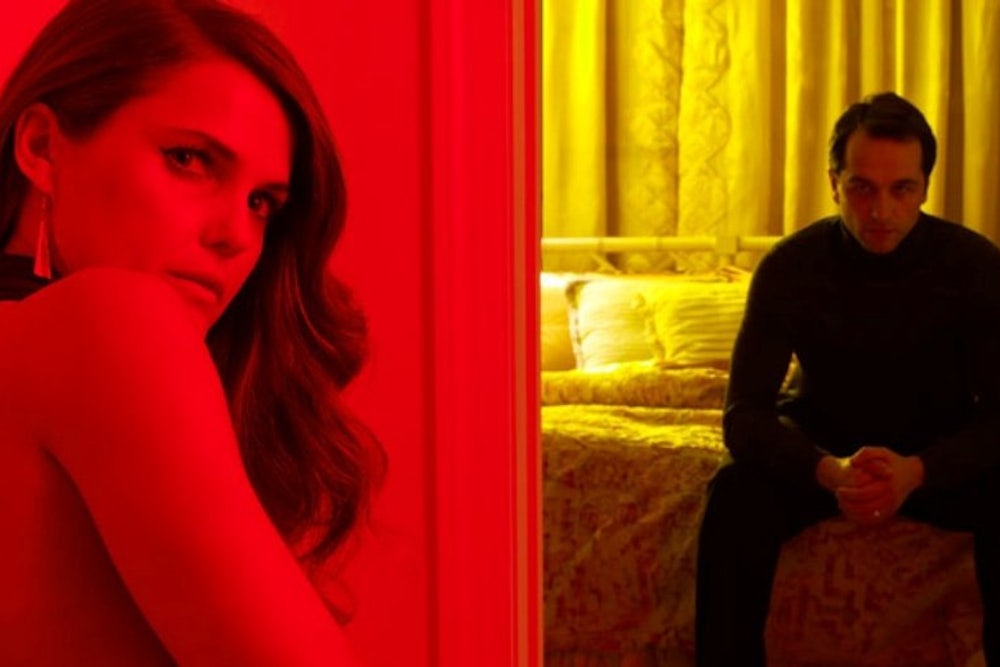“The Americans,” which premieres tonight on FX, is the rare spy thriller in which we are fully encouraged to root against ourselves. The year is 1981 and Philip and Elizabeth Jennings are Russian secret agents masquerading as an unexceptional American family, complete with two children, in the suburbs of D.C. They run a travel agency as a front for their espionage. When the kids are asleep they bash in heads and stash KGB defectors, bound and gagged, in the trunk of their car. The real Americans are mostly pests and nitwits, wool pulled firmly over their eyes; the Russians are our crafty heroes. And from the very first scene—in which Elizabeth, in a frosty blond wig, seduces a buffoonish FBI agent—we know that we are on their side.
Keri Russell, best known as the sensitive ingénue of the WB’s “Felicity,” plays Elizabeth Jennings, her pert, expressive features turned to inscrutable stone. In flashbacks we see her training with the KGB, working to banish her Russian accent, learning to fight. Then in one brutal scene she gets raped by an officer, and we can sense something in her begin to harden. Her husband Philip (Matthew Rhys) is the softer of the two, riddled by existential doubts. The Jennings’s marriage was arranged by KGB officials some two decades ago; in another flashback we see them meet for the first time, shyly, over tea. After so many years, Philip feels the grip of the motherland waning. “What’s so bad about America?” he says. “The electricity works all the time.”
One of the key strengths of this very satisfying show is its dense, taut depiction of the marriage at its center: the resentments and the blind spots, the accumulated intimacy built more on mutual dependence than actual affection. We are reminded again and again how terrifyingly easy it is—even within the intimate confines of a marriage—to hide things, to cordon off parts of yourself. The Jennings’s shared double life feels like the one thing keeping them together. But their drifting priorities threaten to become an impassable gulf. “Maybe this is the perfect time to think about living the life we’ve been living—but just really living it. Just being us,” Philip says. “I would go to jail, I would die, I would lose everything before I would betray my country,” Elizabeth fires back. She bristles as he tries to embrace her while she cooks. Their first onscreen kiss occurs after they have jointly murdered a KGB defector. This is not the cool, slick marital choreography of “Mr. and Mrs. Smith”; it’s a real, messy union that functions and falters.
Alongside the epic clash of Communism and capitalism, we see the smaller strains of family life. “Things are different than when you grew up,” Elizabeth’s thirteen-year-old daughter announces when she is chastised over an exposed bra strap. “Like, people are freer.” The show’s most fascinating moments are often the finely wrought exchanges between family members who know less about each other than they think they do. Two parallel spheres are jointly hinted at: the world of daily household dramas, with its adolescent growing pains and its mother-daughter spats; and the broader political one, equally fraught, with its drastically bigger stakes. Scenes of intense brutality cut away to quiet domestic moments: Philip watching his son sleep, Elizabeth piercing her daughter’s ears.
One feature of standard spy fare that is notably missing from “The Americans” is whiz-bang gadgetry: notes are left under rocks, wiretaps must be manually installed in clocks, messages are hand-delivered. Even “The Man From U.N.C.L.E,” which aired in 1964, featured agents inspecting wall-sized computer screens as they planned their missions. But here the low-tech stunts give the show an atmosphere of hard-boiled urgency. The absence of gadgets forces confrontation; it ups the human stakes. In every recon caper the strings are visible, the mechanics laid dramatically bare.
But the most singular accomplishment of “The Americans” is the way it unapologetically cheers on the Russians in their efforts to sabotage the United States, while slyly reminding us that we were ultimately in the right. “You hear Reagan ranting and raving,” Elizabeth says. “I mean, he’s crazy. The man literally wants to destroy us.” The show doesn’t just conjure an atmosphere of Cold War paranoia, the sense of eyeing your neighbors and wondering who might be against you; it summons the reassuring certainty of a more concrete political era. The ambiguity at the heart of Zero Dark Thirty and “Homeland”—the characters who leave you constantly scanning their faces for psychological clues, the needling questions of “How much do they know, and what are they hiding?”—is not the driving force here. “The Americans” plants us fully inside the head of our enemy. It is a throwback to a time when U.S. foreign policy seemed less contentious in its aims, simpler in its tactics, easier to justify.
“This is a show where the enemies are the heroes, with all the questions that come with that,” the show’s creator, former CIA officer Joe Weisberg, has said. “You couldn’t do that right after the Cold War. But you can do it 30 years later.” Will Al-Qaeda, three decades from now, make for a similarly appealing protagonist? Or is the tense, unconsummated limbo of the Cold War a singularly safe space to wrestle with the moral knots in U.S. foreign policy? Like “Homeland,” “The Americans” makes you think about what matters more on the scale of a human life: family or ideology, love or a cause. But while “Homeland” strenuously avoids taking sides, “The Americans” is not afraid to pick heroes. It takes the concrete landscape of 1980s America and pumps it full of the retrospective anxiety of our current political age.
